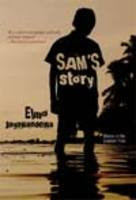Book Review
Author: Elmo Jayawardena
Pages: 173
Pilot-turned-author Elmo Jayawardena’s award winning debut novel, Sam’s story, is an enriching read in many ways. It delves into poignant issues concerning a war-ravaged country for fifteen years, with such innocence and simplicity that the narrative moves you immensely at one point and leaves you in splits at the other.
With the backdrop of the Sri Lankan civil war, Sam’s story explores the life and journey of a poor, dim-witted and illiterate boy who comes to Colombo to work as a houseboy from a village too small and distinct to have any known existence. While the storyline marks the drastic transition in Sam’s life --- from a poverty struck place (where humans are compelled to live a life worst than dogs) to a luxurious surrounding in the River House (where pet dogs have a better standard of living than most humans) --- it also uses Sam as the anchor to portray the tension created by the war and its hazardous effects on the psyche and lives of people in a permanent war-struck country.
What makes this novel interesting is its language structure. Being in the words of Sam himself, the narrative is in a very direct and unrefined tone but still manages to keep the idiosyncrasies of the characters intact. Sam’s voice underlines the undiminished hypocrisy in society that continues to have a strong foothold even in the most horrid circumstances along with throwing light on the clear demarcation between the rich and the poor. As a detached spectator, who is yet inevitably involved in the scheme of things, Sam’s observations and viewpoints on war, poverty, richness, friendship and love present the ironies of life in the most cruel possible manner.
Through Sam’s experiences, Jayawardena has weaved in a heart wrenching saga of a trembling country, strangled in identity crisis. It highlights the adversities of the ‘ill fated’ or the ‘poor’, who are battling for an unknown cause and losing their lives in the bargain under the pretext of earning a living and mocks at the strata of society that’s too busy discussing “the country’s problems” over a glass of wine to actually act towards something concrete. In Sam’s words: “Only the weekends were busy, especially Friday nights when my Master’s friends came to the River House to drink and eat and solve the country’s problems.” With a strong undercurrent of sarcasm, this book is actually a mirror of the ‘perfect’ imbalance that the nations across the world rest on. Also, the outright simplicity in description of certain events and relationships just bowls you over.
The strength of Jayawardena’s storytelling with this novel lies in its coarseness. The harshest of realities are conveyed in the harshest of words. There is no nuance in the language which makes it a compelling and thought provoking read. Also, where on one hand, you come across tremendous sadness prevailing in a country and among its people, the author makes sure that he sprinkles the right amount of humour to avoid the book to be overtly depressing and disturbing. In that sense, this is a wonderfully balanced work.


Comments